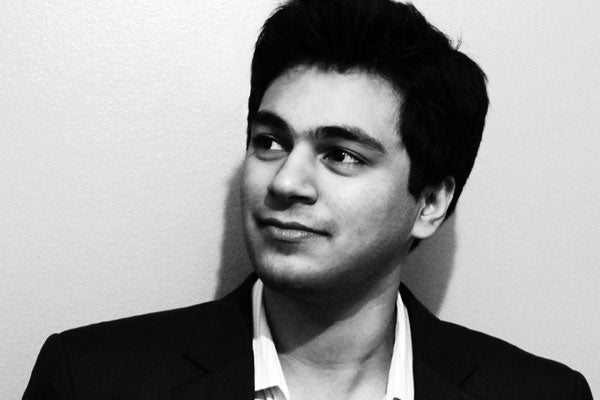
Where entrepreneurship meets technology
Published: October 30, 2012
Hamza Javed zeroed in on the master of science in applied computing (MScAC) program at the University of Toronto because it was a “perfect blend of the two things I love – entrepreneurship and computer science.”
With a personal interest in software development and web/mobile-based startups, Javed is enthusiastic about the vast potential of the field.
“I have several ideas of my own, and the freedom and market reach of web and mobile platforms is very enticing," he says.
Launched in 2010, the MScAC program welcomed 14 new students this fall. Like his classmates, Javed was selected for the unique program because of his track record for making an impact and showing extraordinary initiative.
“I’ve often indulged in side projects,” says Javed. “By the end of [my second year in university] I had a firm grasp of fundamental programming concepts and I started freelancing as a programmer and graphic designer on mostly international projects I found online.”
Carrying this further, Javed found himself taking on new and different technology challenges, finally starting his own company while still an undergrad, and creating a name for himself in the industry.
Originally from Pakistan, Javed used his skills to help that country in 2010, when Pakistan was hit by the worst flood it had ever seen. Having volunteered previously in relief efforts, Javed brought his growing computer skills to this challenge.
“Having enough experience with the Google Maps API, I created a simple web and mobile interface where users could upload various data like their GPS co-ordinates, population stats, damage information, and support requirements, and that would automatically show up on a map – so relief workers could view the maps and plan their distribution strategies accordingly.”
With such a broad background, it’s not surprising to hear why Javed chose to apply to the MScAC program.
“I would like to better my business skills, and have a successful startup accelerator in this part of the hemisphere, and this program is the perfect funnel into that market,” he explains. “I think the MScAC draws applicants who want to be effective leaders in the CS field. The program attracts… eventual CEOs, CTOs, and directors.”
The MScAC combines 8 months of in-class course work, and 8 months of an internship, where the student works directly on exploratory research projects; when asked about his ideal placement for the program’s 8-month internship component, Javed expresses interest in “maybe a startup accelerator or an incubator… web and mobile startup development.”
He is also busy soaking up the coursework.
“So far, it is very interesting… I especially enjoy the business and communications-related courses I am taking," Javed says. "It’s an essential education that is very different from a regular CS master’s program.”
While Javed’s own story is that of an international entrepreneur,the professional master’s program appeals to candidates with a broad range of interests and backgrounds.His classmates include graduate students from other academic fields, mothers who were once IT professionals and are now returning to the workplace after raising a family, and those looking to brush up on their technical knowledge and make a career change.
It is this diversity that makes the MScAC both unique and challenging, and the department puts a strong focus on maintaining the quality of the program, both in the classroom and in the value of internships offered. The first class of program graduates were all offered jobs from their internship companies — although one graduate declined, choosing to start his own company instead.
“This speaks to the calibre of the students in this program," says Professor Eugene Fiume, academic director of the program, "people who are inspired and passionate about technology, and are excited to bring their knowledge into industry.”
Like his fellow MScAC candidates, Javed is thrilled to be in Toronto at the department of computer science.
“It is host to some of the most brilliant minds in the world, students and teachers alike… I believe that by interacting and exchanging ideas with said minds, be it in lectures, labs or the coffee shop, they can benefit and improve me…”
With a smile, he adds, “And I might do the same for them.”



